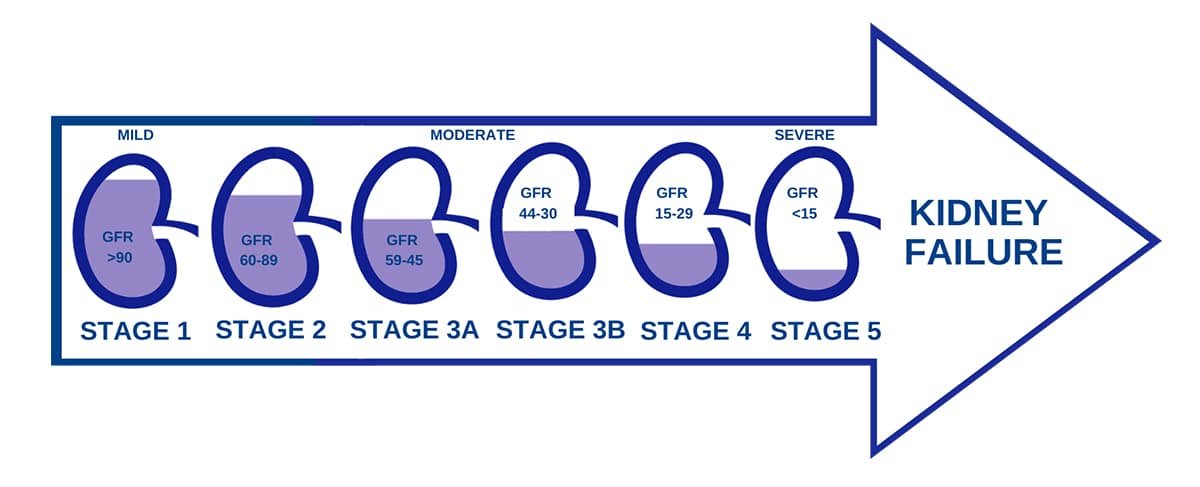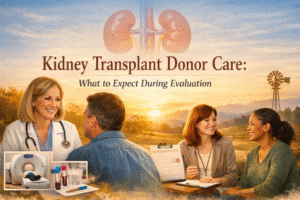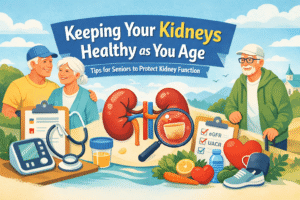Kidney disease typically develops gradually, progressing through distinct stages when the underlying causes remain unaddressed. By identifying these phases, patients and their healthcare teams can adopt strategies that slow decline and enhance everyday well-being.
At Southern Oklahoma Kidney Center, nephrologists work closely with each person to pinpoint their current stage and draft a tailored plan aimed at preserving kidney function over the long haul.
What Are the Stages of Kidney Disease?
Clinicians classify kidney disease into five stages, using the glomerular filtration rate (GFR) as the key yardstick. This measure reflects the kidneys ability to remove waste from the blood; a falling GFR signals declining function.
Stage 1: Normal or High Kidney Function (GFR 90+)
Many people feel fine at this stage and experience no obvious symptoms. Yet urine tests may reveal protein leakage or imaging may show minor structural changes, hinting that damage has begun.
What To Do Now:
- Keep blood pressure and blood sugar within target range.
- Quit smoking and cut back on salt and processed foods.
- Schedule regular visits with a nephrologist for ongoing review.
At SouthernOKC, proactive care at stage one aims to halt further injury and protect long-term health.
Stage 2: Mild Decrease in Kidney Function (GFR 60–89)
At this stage, few or no obvious symptoms appear, yet subtle evidence of damage becomes perceptible. Physicians typically reach a diagnosis only when added clues, such as persistent hypertension or a family history of renal trouble, surface.
Recommended care:
- Follow a kidney-friendly diet
- Control underlying conditions like diabetes
- Monitor GFR regularly
The Kidney Disease & Diabetes page highlights that seemingly mild injury can progress if blood-glucose levels remain unstable.
Stage 3: Moderate Kidney Function Loss (GFR 30–59)
Waste products now accumulate more noticeably, and the body may signal distress through fatigue, swelling, or altered urination patterns. Clinicians further divide this stage into two subcategories, 3a (GFR 45–59) and 3b (GFR 30–44).
Management tips:
- Reduce protein and sodium intake
- Treat anemia and bone-health issues
- Start planning for future treatment options
The Kidney Disease & Anemia page explains that low red-blood-cell counts often underlie the fatigue and weakness many experience in Stage 3.
Stage 4: Severe Kidney Damage (GFR 15–29)
In this advanced phase renal function is critically low, and clinical signs become increasingly apparent. Patients often report:
- pronounced swelling, particularly in the legs or around the eyes
- shortness of breath during modest exertion or at rest
- nausea that recurs independent of food
- difficulty concentrating or remembering recent events
Primary clinical interventions now emphasize a tightly controlled diet, judicious fluid intake, and the timely selection between dialysis or transplant. Equally important is the ongoing management of biochemical derangements, most notably elevated phosphorus. The Southern Oklahoma Kidney Center stands ready to guide patients through these choices, providing clear information on the distinct forms of dialysis and the referral process for transplantation.
Stage 5: Kidney Failure (GFR <15)
This terminal stage, frequently termed End-Stage Renal Disease (ESRD), indicates that the kidneys can no longer perform the basic task of waste filtration. At this point symptoms worsen markedly and may include severe fatigue, restless legs, persistent vomiting, and altered mental status.
Therapeutic options at Stage 5 center on renal replacement therapy. Patients typically elect either hemodialysis at a clinic or home-based peritoneal dialysis, depending on lifestyle and medical suitability. Simultaneously the transplant team assesses candidacy, a process that often begins months in advance. Throughout this transition a nephrologist will collaborate with the patient to establish a sustainable, individualized management plan. Detailed guidance on the transplant pathway is available in the companion document Preparing for a Kidney Transplant and throughout the SouthernOKC ESRD web portal.
Why Early Detection Matters
Catching kidney disease in its early stages dramatically improves prognosis. Routine screening, coupled with modest dietary adjustments and prompt pharmacologic intervention, can decelerate disease evolution and preserve quality of life for many additional years.
Grasping the different stages of kidney disease equips patients to make informed choices and safeguard their well-being. No matter if you are experiencing early signs or more advanced symptoms, the Southern OKC team stands prepared to provide specialized guidance and compassionate assistance at every phase.
Arrange your kidney health assessment today and step confidently toward a stronger tomorrow.




